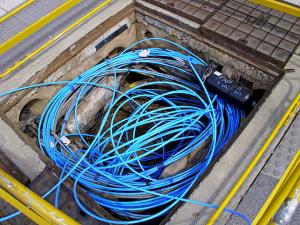Cost of super-fast fibre connections straight to homes dramatically reduced, research suggests
 Hardware built and tested by researchers at the University College London (UCL) could help provide super-fast internet to homes and significantly reduce costs, a study published in the Journal of Lightwave Technology has suggested.
Hardware built and tested by researchers at the University College London (UCL) could help provide super-fast internet to homes and significantly reduce costs, a study published in the Journal of Lightwave Technology has suggested.
The study, which was set up to research and design cheap and future-proof hardware to solve the bottleneck of the 'last mile problem' in internet connectivity, believes that it has researched and developed a “simplified optical receiver” that rids itself of the “last mile bottleneck.”
The 'last mile' issue is where households and businesses are connected to the network via a fibre-to-the-cabinet (FTTC) connection and then copper wiring takes broadband from the cabinet to the household over the 'last mile'.
Scientists in an interview with the Journal, believe they have solved this issue by developing an optical receiver, which will provide true fibre-to-the-home (FTTH) broadband technology, that can provide speeds of up to 10 GB/s. The paper suggests that the new technology will have a significant impact on reducing costs as well as improving network reach.
Policy makers and industry experts are largely in agreement that connections like FTTH is the way forward in network future proofing, particularly with the growing demand for bandwidth. Currently less than one per cent of the United Kingdom are connected this way, due to the cost of installing fibre optic wiring to replace the copper wiring.
Lead researcher Dr Sezer Erkilinc commented on a potential release: “Once we've quantified the laser stability, we will be in a strong position to take the receiver design through field trials and into commercialisation. It is so exciting to engineer something that may one day be in every one's homes and make them a part of the digital revolution.”
hSo provides managed networks designed for business. To get an instant cost for a leased line at your location, visit our online leased line price checker.
Bidgee)







